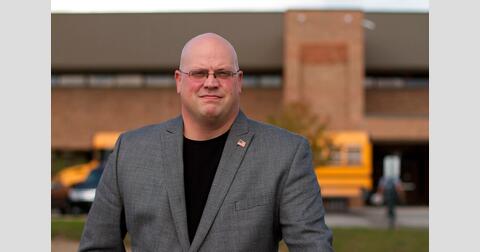Union, District Force Non-Union Teacher to Pay for Union Release Time
Teacher Adam Neuman sues MEA affiliate and Brighton Schools
Brighton teacher Adam Neuman went to Afghanistan to fight for freedom. Now he simply wants to exercise it back home.
As a combat veteran who served in the Kandahar Province for nearly a year, the civics teacher regards attacks on his liberty as a personal affront. So, when the teachers union and his employer told him they were taking money from his paycheck to pay for a teacher to leave the classroom to work on union business, Neuman felt he had no choice but to sue.
In August, Neuman quit the Michigan Education Association and its local affiliate, the Brighton Education Association, exercising his rights under Michigan’s right-to-work law. But the union informed him that he would still be bound by provisions in the teachers contract, including a requirement to pay for so-called “release time,” which allows the union steward to work on union matters during the school day.
The costs comes out of the school’s budget, and now the union and the school district, Brighton Area Schools, are trying to get non-union members to pay for it as well. The release time practice cost taxpayers statewide at least $2.7 million annually as of 2011. The Michigan House passed a bill banning the practice but it has languished in the Senate.
“My interpretation was simply that when you opt out of the union, you are out of the union and you do not have to contribute anything financially,” said Neuman.
Neuman is getting legal assistance from the Mackinac Center Legal Foundation.
MCLF attorneys Patrick Wright and Derk Wilcox believe the payroll deduction violates two Michigan laws – right-to-work and another 2012 law prohibiting the use of school resources to collect union dues or fees.
“We want the courts to tell the school district and the union that what they have put in this contract is wrong and unenforceable and they will have to remove it,” Wilcox said.
Neuman's complaint was filed today in the Livingston County Circuit Court against the Brighton Education Association and the Brighton Area Schools Board of Education for violating MCL 423.210, Michigan’s right-to-work law and the prohibition against the use of school resources to collect dues or fees for a union.
"What part of opting out does the union not understand?" said Patrick Wright, vice president for legal affairs at the Mackinac Center for Public Policy. "They are not allowed to raid a non-member's paycheck."
Neuman believes the union may have had two reasons to keep the offending language in the contract. In addition to providing a cash stream, the clause could intimidate members from opting out of the union. Neuman says he knows teachers who feel that way.
“Their opinion was, they wanted out, but if they’re going to still take my money, I might as well stay in so I can at least vote,” said Neuman.
Brighton Superintendent Greg Gray did not respond to a request for comment.
Right-to-work violators face a $500 fine and may also be responsible for legal fees. The Teamsters agreed to pay part of the legal bill when it settled a suit filed by Dearborn city workers who had left the union and were being told they would have to pay a fee for grievance filings.
Wright believes Neuman will prevail, as well.
Michigan Capitol Confidential is the news source produced by the Mackinac Center for Public Policy. Michigan Capitol Confidential reports with a free-market news perspective.


 Trump administration sues Michigan over climate litigation against oil and gas companies
Trump administration sues Michigan over climate litigation against oil and gas companies
 Mackinac Center sues Flint Community Schools
Mackinac Center sues Flint Community Schools
 Hydra-Lock employees vote to decertify their union
Hydra-Lock employees vote to decertify their union

.jpg) Michigan schools seek $1.6 billion in new public debt May 6
Michigan schools seek $1.6 billion in new public debt May 6
 Lawmakers a step closer to cutting income tax
Lawmakers a step closer to cutting income tax
 Livonia to pitch $150M bond proposal on Aug. 5
Livonia to pitch $150M bond proposal on Aug. 5